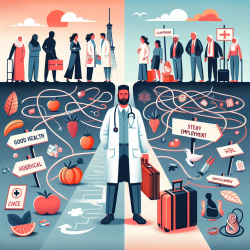The World Health Organization (WHO) has been a cornerstone of global health governance since its inception in 1948. As it marks its 75th anniversary, the organization stands at a critical juncture, facing unprecedented challenges and opportunities for reform. For practitioners in the field of health and education, understanding these developments is crucial for improving skills and aligning with future global health standards.
The Significance of WHO's 75th Anniversary
The 75th anniversary of WHO is not just a milestone; it is a pivotal moment that calls for reflection and reform. The ongoing COVID-19 pandemic has highlighted the need for robust global health governance and exposed vulnerabilities in current systems. The WHO has proposed comprehensive reforms in financing, governance, norms, human rights, and equity to address these challenges.
Key Reforms and Their Implications for Practitioners
- Financing: The proposal to increase assessed contributions to 50% of the WHO budget by 2030 aims to provide more predictable and flexible funding. Practitioners should be aware of how this could impact resource allocation and support for global health initiatives.
- Governance: Enhancing inclusivity in WHO governance by engaging non-state actors such as civil society organizations can lead to more comprehensive health strategies. Practitioners can benefit from understanding these dynamics to better advocate for community needs.
- Norms: Strengthening normative frameworks, particularly in areas like pandemic preparedness and response, will require practitioners to stay informed about new guidelines and protocols.
- Human Rights: Emphasizing the right to health as a fundamental human right aligns with broader goals of equity and justice. Practitioners should integrate these principles into their practice to ensure inclusive care delivery.
- Equity: Addressing structural inequities within and among countries is essential for achieving health equity. Practitioners should focus on data-driven approaches to identify and address disparities in healthcare access.
Encouraging Further Research
The insights from WHO’s anniversary highlight the importance of continuous learning and adaptation in healthcare practices. Practitioners are encouraged to delve deeper into these topics by engaging with research publications, attending relevant conferences, and participating in webinars. This proactive approach will not only enhance individual skills but also contribute to a more resilient global health system.
To read the original research paper that inspired these insights, please follow this link: The WHO’s 75th anniversary: WHO at a pivotal moment in history.










